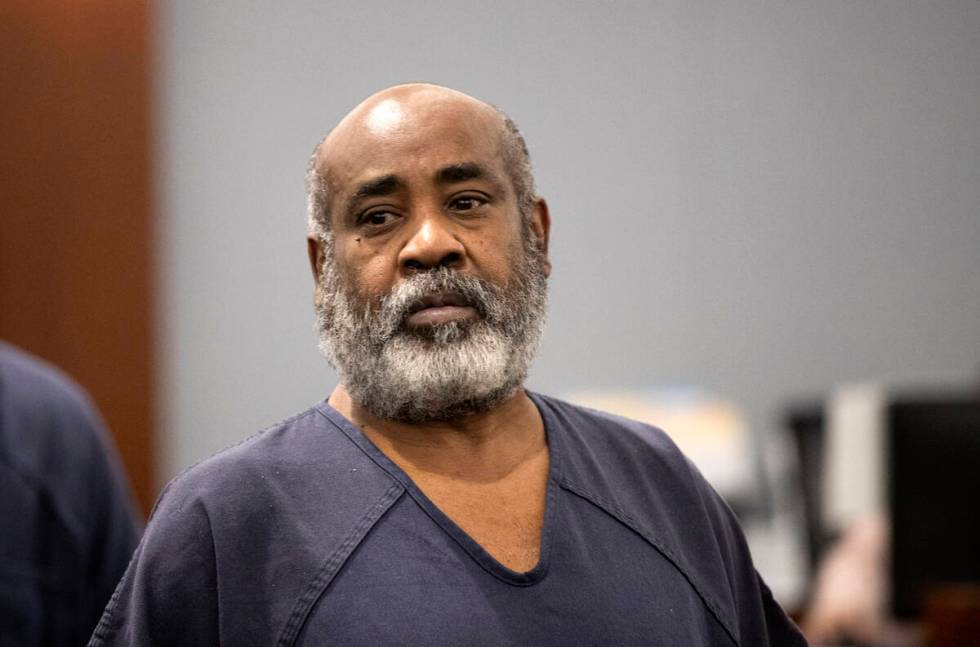Prosecutors: Tupac witnesses could be in danger if suspect gets bail

A bail hearing has been postponed for the man accused of orchestrating the 1996 slaying of hip-hop icon Tupac Shakur in Las Vegas.
Duane “Keffe D” Davis, a 60-year-old alleged member of the South Side Crips, has been held in the Clark County Detention Center without bail since he was indicted in September on a murder charge in connection with Shakur’s slaying. The continuance of Tuesday’s bail hearing came less than a week after prosecutors filed court documents claiming Davis would be a danger to the community if he were released and that witnesses in the case could be in danger.
Prosecutors wrote that during jail phone calls, Davis has been “focused on witnesses in the case,” and his “ire has centered on two witnesses” who testified during this summer’s grand jury hearings.
According to the court filing, Davis referenced a “green light” authorization during a phone call with his son. The filing did not indicate that Davis directly instructed anyone to harm a witness, although federal agents notified at least one of the witnesses about the call.
“In Defendant’s world, a ‘green light’ is an authorization to kill,” prosecutors wrote in the motion, filed Dec. 28.
Davis is set to appear in court again on Jan. 9 for a status check and bail hearing.
Earlier in December, Chief Deputy Special Public Defenders Robert Arroyo and Charles Cano filed a motion for Davis to be released on his own recognizance or to be placed on bail not to exceed $100,000. The motion said that Davis’ statements about his involvement in Shakur’s killing, detailed in his 2019 co-written book, were made for financial gain and “entertainment purposes.”
Arroyo and Cano did not respond to request for comment on Tuesday.
In their response to the motion, prosecutors argued that Davis made similar statements to Metropolitan Police Department detectives in 2009. The motion also references a 2008 “proffer agreement” between Davis and federal agents, in which Davis reportedly gave information about Shakur’s killing in exchange for the potential of receiving a lighter sentence for drug charges.
Although apparent recordings of the conversation between Davis and federal agents have been publicized, prosecutors wrote that they were not presented to a grand jury because of the “inability to know the circumstances of those recordings.”
But prosecutors also wrote that it’s “unclear” which information is protected by the proffer agreement.
“If Defendant’s position is that his statements are all lies, then his proffer would certainly be admissible at trial,” Chief Deputy District Attorney Marc DiGiacomo wrote in the motion.
Davis has been accused of authorizing the shooting that killed Shakur and wounded Death Row Records CEO Marion “Suge Knight” in September 1996. The killing was part of a feud between the South Side Crips and the Mob Piru Gang and was in retaliation for a fight involving Shakur and Davis’ nephew, Orlando Anderson, prosecutors have alleged.
The Mob Piru Gang, who were associated with Death Row Records, had a longstanding rivalry with the South Side Crips and Bad Boy Records, which was founded by Sean “Diddy” Combs and represented Christopher “Biggie” Wallace, prosecutors have said.
Prosecutors’ recent filing detailed Davis’ 2009 interview with Las Vegas police, during which he claimed he obtained the gun used to kill Shakur from the drug dealer Eric “Von Zip” Martin, who Davis said was associated with Combs.
According to transcripts of the interview, included as an exhibit with the state’s motion, Davis tried to obtain money from Martin after Shakur’s killing, but he said he did not receive any payment.
“Defendant confessed over and over again that he is responsible for the murder of Tupac Shakur,” prosecutors wrote in the motion. “Now, finally, facing the consequences of his actions, Defendant asks this Court to ignore his words.”
Contact Katelyn Newberg at knewberg@reviewjournal.com or 702-383-0240.